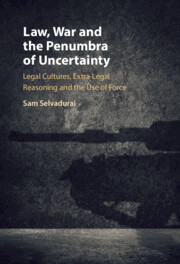Book contents
- Praise for Law, War and the Penumbra of Uncertainty
- Law, War and the Penumbra of Uncertainty
- Law, War and the Penumbra of Uncertainty
- Copyright page
- Contents
- Figures
- Acknowledgements
- 1 Introduction
- Part I Varieties of Uncertainty in the Jus Ad Bellum
- 2 Uncertainty about Law in the Jus Ad Bellum
- 3 Uncertainty about Facts in the Jus Ad Bellum
- Part II The International Court of Justice, UK-Based Lawyers and the Jus Ad Bellum
- Part III Managing Uncertainty: Reconciling Legal and Extra-legal Reasoning
- Bibliography
- Index
2 - Uncertainty about Law in the Jus Ad Bellum
from Part I - Varieties of Uncertainty in the Jus Ad Bellum
Published online by Cambridge University Press: 31 March 2022
- Praise for Law, War and the Penumbra of Uncertainty
- Law, War and the Penumbra of Uncertainty
- Law, War and the Penumbra of Uncertainty
- Copyright page
- Contents
- Figures
- Acknowledgements
- 1 Introduction
- Part I Varieties of Uncertainty in the Jus Ad Bellum
- 2 Uncertainty about Law in the Jus Ad Bellum
- 3 Uncertainty about Facts in the Jus Ad Bellum
- Part II The International Court of Justice, UK-Based Lawyers and the Jus Ad Bellum
- Part III Managing Uncertainty: Reconciling Legal and Extra-legal Reasoning
- Bibliography
- Index
Summary
Chapter 2 considers legal uncertainty in the jus ad bellum as defined in the UN Charter and other sources of law. It describes paradigms, framing this law around ‘plain cases’ of lawful and unlawful force. Supervaluationism describes paradigms as determined not by one but several tests, overlapping but not co-extensive - cases may meet all or only some tests. Fuzzy logic refutes binary distinctions between lawful and unlawful force, arguing these are end-points of a continuum, separated by a ‘penumbra of uncertainty’. The chapter outlines ‘hard cases’ of force, different to cases the UN Charter most obviously prohibits: anticipatory self-defence, pre-emptive self-defence, self-defence against non-state actors, humanitarian intervention, use of force to prevent WMD proliferation. The chapter describes how interviewees and survey participants evaluated such justifications, the results displaying the vagueness already identified. The chapter identifies one possible explanation: lawyers align with different ‘interpretive cultures’, holding different opinions about valid legal tests and interpretive techniques. ‘Restrictivists’ prefer ‘formalist’ interpretation techniques, while ‘expansionists’ prefer ‘dynamist’ interpretation techniques.
Keywords
- Type
- Chapter
- Information
- Law, War and the Penumbra of UncertaintyLegal Cultures, Extra-legal Reasoning and the Use of Force, pp. 23 - 67Publisher: Cambridge University PressPrint publication year: 2022

